Pet allergies are a widespread issue affecting many individuals worldwide. People who are allergic to pets suffer from various symptoms triggered by exposure to allergens found in animal skin cells, saliva, or urine. These allergies can affect the quality of life, especially for those who love animals but are sensitive to them.
This article provides an understanding of pet allergies, including their causes, symptoms, side effects, diagnosis, and treatment options such as antihistamines, syrups, and tablets to help alleviate symptoms.
Recommended Reading: Over The Counter Antihistamine For Hives (Causes And Symptoms)
Best Allergy Medicine For Pet Allergies {Medication, Diagnosis, And Treatment]

Table Of Contents
Recommended Reading: Food Allergy Treatment At Home (Causes, Symptoms, And Treatment)
What Is Pet Allergy?
What Is Pet Allergy?
Pet allergy is an immune reaction to proteins from an animal’s skin, saliva, or urine, causing symptoms like sneezing and itchy eyes.
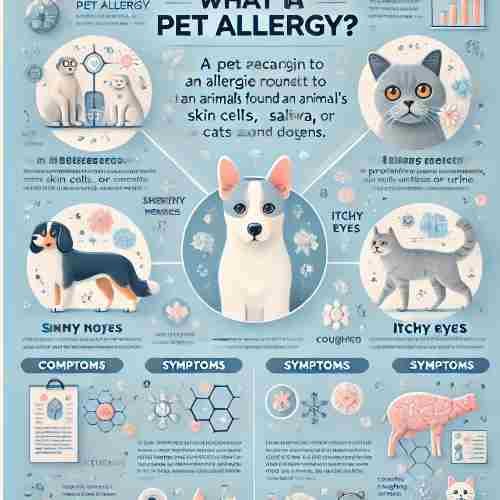
A pet allergy is an allergic reaction to proteins found in an animal’s skin cells, saliva, or urine. It commonly affects people who are sensitive to these proteins, especially those with fur, such as cats and dogs.
Common symptoms include sneezing, runny nose, itchy eyes, and coughing. Some people may also experience more serious symptoms like wheezing or asthma. Pet allergies are often triggered by contact with pet dander, which is tiny flakes of skin shed by animals.
Diagnosis of Pet Allergies
Diagnosis of Pet Allergies
Pet allergy diagnosis involves a skin or blood test to detect reactions to animal allergens like dander, helping identify the specific cause.
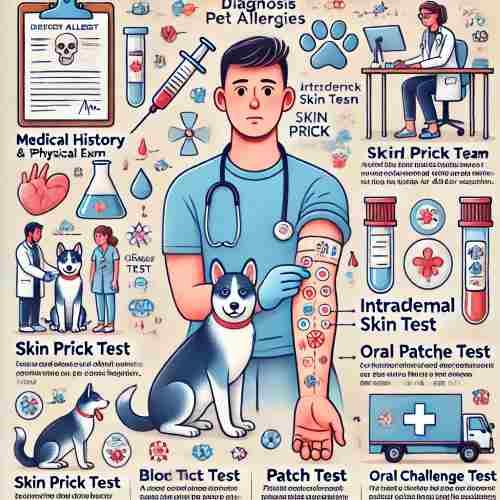
Here are 10+ ways to diagnose pet allergies:
- Medical History and Physical Exam:
- Your doctor will ask about your symptoms, what triggers them, and any changes in severity.
- They may use a lighted instrument to check your nasal passages for swelling or discoloration.
- Skin Prick Test:
- A small amount of allergen is pricked into your skin, typically on your forearm or upper back.
- The area is monitored for signs of a reaction (like swelling or redness) within 15-20 minutes.
- Blood Test:
- A small amount of blood is drawn from your arm to test for IgE antibodies, which indicate an allergic reaction.
- The sample is sent to a lab for analysis.
- Intradermal Skin Test:
- A more sensitive test where allergens are injected deeper into the skin.
- Swelling or redness helps determine the allergy.
- Patch Test:
- Allergen patches are applied to the skin for 48 hours to detect delayed allergic reactions, especially skin-related allergies.
- Oral Challenge Test:
- Allergens are taken orally in small amounts under medical supervision to see if an allergic reaction occurs.
- Intradermal Testing for Pets:
- Intradermal testing is the gold standard for diagnosing pet allergies in animals.
- It’s more accurate but requires sedation and is typically more expensive.
- Blood Testing for Pets:
- Vets may perform blood tests to identify specific allergens and create an allergy shot plan for pets.
- 5Strands Test:
- Uses bio-resonance technology to scan a hair sample for intolerances and allergies in pets.
- Nasal Examination:
- Doctors may use nasal sprays or medications like pseudoephedrine to shrink swollen nasal tissues, helping in diagnosis.
Recommended Reading: Is Hay Fever Contagious? Causes, Symptoms, And Treatment
Top Treatments for Pet Allergies
Top Treatments for Pet Allergies
Top treatments for pet allergies include antihistamines, nasal sprays, and reducing exposure to pet dander for symptom relief.
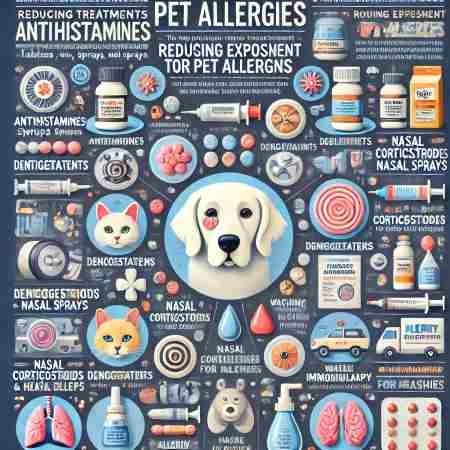
Antihistamines
- Function: Reduce sneezing, runny nose, and itchy eyes by blocking histamines.
- Forms: Available as tablets, syrups, or nasal sprays.
Decongestants
- Function: Relieve nasal congestion by shrinking swollen nasal passages.
- Forms: Available as pills, nasal sprays, or drops.
Nasal Corticosteroids
- Function: Reduce inflammation in the nasal passages, providing relief from congestion and sneezing.
- Usage: This can be used regularly for long-term symptom control.
Bronchodilators
- Function: Open airways and relieve breathing difficulties, especially for those with asthma symptoms triggered by pet allergens.
- Forms: Often prescribed as inhalers.
Immunotherapy (Allergy Shots)
- Function: Involves getting small amounts of the allergen over time to help the body build immunity.
- Long-term Benefit: May reduce sensitivity to pet allergens permanently.
Desensitization
- Function: A type of immunotherapy where the immune system is slowly exposed to pet allergens to develop tolerance.
Reducing Exposure to Pet Allergens
- Avoid Direct Contact: Limit time spent around pets.
- Home Adjustments:
- Clean regularly: Remove pet hair and dander from furniture and floors.
- Use air purifiers: Choose one with a HEPA filter to trap allergens.
- Vacuum frequently: Use a vacuum with a HEPA filter to clean carpets and rugs.
- Wash fabrics: Use anti-allergy covers on pillows and mattresses.
- Change clothes and wash hands: After playing with pets, change clothes and wash hands to remove allergens.
Medications for Pet Allergies
- Antihistamine Tablets: Reduce sneezing and other allergy symptoms.
- Syrups: Effective for children and those who prefer liquid medication.
- Injections: Given in cases of severe allergic reactions or anaphylaxis.
Nasal Spray for Pet Allergies
- Function: Helps to relieve nasal congestion and inflammation caused by pet dander.
Skin Lotions
- Use: If pet allergens cause skin irritation or rashes, topical lotions can soothe the skin.
Home Remedies
- Ventilation: Ensure your home is well-ventilated to prevent the buildup of allergens.
- Regular Cleaning: Dust, vacuum, and mop frequently to reduce pet dander in the house.
Recommended Reading: Natural Allergy Remedies For Eyes (Without Eye Drops)
Top Antihistamines For Pet Allergies
| Antihistamine Name | Brand Name | Form | Usage | Key Benefits |
|---|---|---|---|---|
| Cetirizine | Zyrtec | Tablet, Syrup | Once daily for allergy relief | Reduces sneezing, runny nose, itchy eyes |
| Fexofenadine | Allegra | Tablet, Liquid | Once or twice daily | Non-drowsy, long-lasting symptom relief |
| Loratadine | Claritin | Tablet, Syrup | Once daily for mild allergies | Non-drowsy, helps with itchy eyes, nose |
| Levocetirizine | Xyzal | Tablet, Liquid | Once daily for stronger symptoms | Provides all-day relief, works quickly |
| Desloratadine | Clarinex | Tablet | Once daily for long-term allergies | Non-drowsy, effective for chronic allergies |
| Diphenhydramine | Benadryl | Tablet, Liquid | Taken every 4-6 hours | Fast-acting but may cause drowsiness |
| Chlorpheniramine | Chlor-Trimeton | Tablet | Every 4-6 hours for symptom relief | Helps with sneezing, itchy eyes, congestion |
| Rupatadine | Rupafin | Tablet | Once daily for seasonal allergies | Reduces hives and pet allergy symptoms |
| Bilastine | Bilosin | Tablet | Once daily for hay fever and hives | Long-lasting, non-drowsy |
| Azelastine | Astepro | Nasal Spray | Twice daily nasal spray | Reduces nasal congestion and sneezing |
| Ebastine | Kestine | Tablet | Once daily for moderate symptoms | Provides all-day relief without drowsiness |
Top 10 Best Tablets For Pet Allergies
Best Tablets For Pet Allergies
The best tablets for pet allergy relief include antihistamines like cetirizine and loratadine, which help reduce sneezing, itching, and congestion.

| Medication Name | Type | Dosage | Usage | Key Benefits |
|---|---|---|---|---|
| Allegra | Antihistamine | 180 mg once daily / 60 mg twice daily | Reduces sneezing, runny nose, and itchy eyes | Non-drowsy, fast relief for pet allergies |
| Benadryl | Antihistamine | 25–50 mg every 4–6 hours | Provides relief from severe allergy symptoms | May cause drowsiness, works quickly |
| Claritin | Antihistamine | 10 mg once daily | Helps with itching, sneezing, and runny nose | Non-drowsy works all day |
| Zyrtec | Antihistamine | 5–10 mg daily | Reduces allergic reactions to pet dander | Fast-acting, effective for 24 hours |
| Pseudoephedrine | Decongestant | Relieves nasal congestion from pet allergies | Clears nasal passages, available in tablet form | |
| Phenylephrine (Sudafed PE) | Decongestant | Eases sinus congestion and pressure | Non-drowsy works quickly | |
| Fluticasone Propionate (Flonase) | Corticosteroid | Relieves nasal inflammation and itching | Reduces long-term allergy symptoms | |
| Mometasone Furoate (Nasonex) | Corticosteroid | Reduces nasal congestion and sneezing | Effective for chronic allergies | |
| Triamcinolone (Nasacort) | Corticosteroid | Treats nasal allergy symptoms | Provides lasting relief for nasal issues | |
| Ciclesonide (Omnaris) | Corticosteroid | Eases allergy-related nasal symptoms | Reduces swelling and congestion in nasal passages |
Recommended Reading: Best Medicine For Runny Nose And Sneezing (Causes And Treatment)
Top 10 Best Syrups For Pet Allergies
Top Syrups For Pet Allergies
The best syrups for pet allergies include antihistamines like cetirizine and loratadine, which ease symptoms such as sneezing and itching.
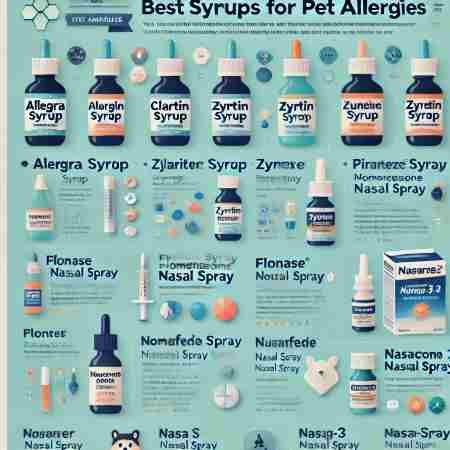
| Syrup Name | Type | Dosage | Usage | Key Benefits |
|---|---|---|---|---|
| Allegra Syrup | Antihistamine | Take once or twice daily as directed | Relieves sneezing, runny nose, and itchy eyes | Non-drowsy provides all-day relief |
| Claritin Syrup | Antihistamine | Once daily | Helps reduce allergic reactions to pet dander | Non-drowsy lasts up to 24 hours |
| Zyrtec Syrup | Antihistamine | Once daily | Eases pet allergy symptoms like itching, runny nose | Fast-acting, suitable for children |
| Piriton Syrup | Antihistamine | As directed, for adults and children (1 year and above) | Treats pet allergies, hay fever, itchy skin | Effective for itching, rashes, and hives |
| Piriteze Syrup | Antihistamine | Recommended from 2 years and up | Provides relief from pet allergies and skin rashes | Reduces itching and sneezing |
| Sudafed Syrup | Decongestant | As directed, usually every 4-6 hours | Relieves nasal congestion from allergies | Eases breathing by reducing nasal swelling |
| Sudafed PE Syrup | Decongestant | As directed | Treats congestion caused by pet allergies | Non-drowsy, helps with sinus pressure |
| Flonase (Fluticasone) Nasal Spray | Corticosteroid | As directed, usually once daily | Reduces inflammation and nasal symptoms | Provides long-term relief |
| Nasonex (Mometasone) Nasal Spray | Corticosteroid | As directed | Treats nasal congestion and allergy symptoms | Effective for long-term nasal relief |
| Nasacort (Triamcinolone) Nasal Spray | Corticosteroid | As directed | Relieves nasal allergy symptoms | Reduces nasal swelling and congestion |
| Omega-3 Syrup | Supplement | As recommended | Helps reduce skin itch and inflammation | Supports skin health and reduces itching |
Top 10 Best Injections For Pet Allergies
| Injection Name | Type | Usage | Key Benefits | Notes |
|---|---|---|---|---|
| Cytopoint | Biological Therapy | Reduces allergic itching in dogs | Works quickly within 24 hours, lasts 4-8 weeks | Safe for dogs of any age |
| Immunotherapy Shots | Allergy Shots | Treats environmental and pet allergies | Helps build tolerance to allergens long-term | Suitable for humans and pets |
| Apoquel Injection | Medication | Reduces itching and inflammation in dogs | Works within hours, helps control symptoms | Requires veterinarian prescription |
| Steroid Injections | Corticosteroid | Reduces severe allergic reactions in pets | Relieves inflammation and allergic symptoms | Short-term relief |
| Depo-Medrol Injection | Corticosteroid | Treats severe allergic reactions in pets | Long-lasting relief from allergies | May have side effects with long-term use |
| Kenalog Injection | Corticosteroid | Manages severe allergy symptoms in pets | Reduces itching and inflammation | Administered by a veterinarian |
| Allergy Immunotherapy Injections | Allergy Treatment | Series of injections with increasing doses of allergen | Builds tolerance, long-term relief | Requires regular injections over 3 years |
| Prednisolone Injection | Corticosteroid | Treats severe allergic reactions in pets | Effective for reducing inflammation quickly | Short-term use only |
| Atopica (Cyclosporine) | Immunosuppressant | Controls atopic dermatitis in dogs | Helps reduce itching and skin inflammation | Administered by a veterinarian |
| Allercept Therapy | Immunotherapy | Allergy injections for pets | Helps the immune system become tolerant | Customized for individual pet allergies |
| Triamcinolone Injection | Corticosteroid | Manages allergic reactions in pets | Reduces inflammation and allergic symptoms | Long-acting relief |
| Dexamethasone Injection | Corticosteroid | Reduces severe allergic reactions in pets | Quick relief from allergic reactions | Should be used under veterinary supervision |
Recommended Reading: Allergy Medicine For Kids: Types, Uses, And Side Effects
Top 10 Best Nasal Sprays For Pet Allergies
Best Nasal Sprays
Top nasal sprays for pet allergies, like Fluticasone and Nasacort, help relieve congestion, sneezing, and itching caused by allergens.
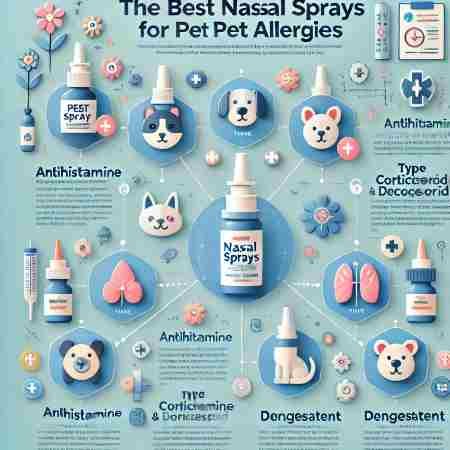
| Nasal Spray Name | Type | Usage | Key Benefits | Notes |
|---|---|---|---|---|
| Astepro Allergy (Azelastine) | Antihistamine Spray | Used to relieve allergy symptoms daily | Reduces sneezing, runny nose, and itching | Can be used every day for ongoing relief from pet allergies |
| Cetirizine (Zyrtec) | Antihistamine Spray | Helps manage pet allergy symptoms | Reduces sneezing, itchy nose, and congestion | Available over-the-counter, good for mild symptoms |
| Fexofenadine (Allegra) | Antihistamine Spray | Treats allergy symptoms like runny nose | Effective for pet-related allergies | Non-drowsy formula, ideal for daily use |
| Loratadine (Claritin) | Antihistamine Spray | Eases allergy symptoms like sneezing | Fast relief from pet allergies | Suitable for daily use, widely available |
| Fluticasone (Flonase) | Corticosteroid Spray | Reduces inflammation and allergy symptoms | Effective for nasal congestion and irritation | Available over-the-counter, helps with chronic allergies |
| Mometasone (Nasonex) | Corticosteroid Spray | Relieves allergy symptoms like stuffy nose | Reduces swelling in the nasal passages | Prescription required in some countries |
| Triamcinolone (Nasacort) | Corticosteroid Spray | Provides relief from pet allergy symptoms | Reduces nasal inflammation and irritation | Can be used daily for continuous relief |
| Pseudoephedrine (Sudafed) | Decongestant Spray | Temporarily relieves a stuffy nose | Opens nasal passages quickly | Not recommended for long-term use, can cause dependency |
| Phenylephrine (Sudafed PE) | Decongestant Spray | Temporarily relieves nasal congestion | Eases breathing through the nose | Use for short-term relief, avoid extended usage |
| Xylometazoline (Otrivin) | Decongestant Spray | Relieves nasal congestion from allergies | Provides fast relief from a stuffy nose | Use short-term to avoid rebound congestion |
| Oxymetazoline (Afrin) | Decongestant Spray | Provides immediate relief from congestion | Quick-acting relief for stuffy nose | Limit usage to avoid dependency and rebound effect |
Top 10 Best Home Remedies for Pet Allergies
| Remedy | Details | Key Benefits | Notes |
|---|---|---|---|
| Wash Your Pet | Bathe your pet regularly using a pet-safe shampoo. | Reduces dander and allergens on their skin | Use mild, pet-specific shampoos |
| Vacuum Often | Vacuum carpets, rugs, and furniture frequently, especially with a HEPA filter. | Removes pet hair and dander from surfaces | Helps keep your home allergen-free |
| Use HEPA Filters | Install HEPA filters in air purifiers, vacuums, and HVAC systems. | Filters out pet allergens from the air | Keeps air clean and reduces allergens |
| Ventilate Your Home | Ensure your home has proper airflow by opening windows or using fans. | Reduces trapped allergens in enclosed spaces | Helps refresh indoor air quality |
| Create Pet-Free Zones | Keep pets out of specific rooms like bedrooms to reduce allergens in sleeping areas. | Provides an allergen-free space | Especially useful in bedrooms |
| Wash Pet Bedding Regularly | Wash your pet’s bedding in hot water to eliminate allergens. | Removes allergens from pet bedding | Wash weekly for best results |
| Take Vitamin C | Consume 2,000 milligrams of vitamin C daily to reduce histamine levels. | Helps manage allergy symptoms naturally | Found in fruits like oranges, kiwis, and broccoli |
| Use a Saline Rinse | Rinse your nasal passages with saline to clear allergens and reduce congestion. | Relieves nasal allergy symptoms | Available in most pharmacies |
| Soak Pet’s Feet in Epsom Salt | Rinse your dog’s feet with Epsom salt after outdoor activities. | Removes allergens stuck on your pet’s paws | Prevents spreading allergens around the home |
| Try Stinging Nettle Tea | Drink stinging nettle tea as a natural remedy to reduce allergy symptoms. | Acts as a natural antihistamine | Consult a doctor before use |
| Use Fish Oil | Give your pet fish oil to improve skin health and reduce inflammation. | Reduces dander and itchiness | Supports healthy skin and coat |
| Remove Carpets & Curtains | Replace carpets and curtains with hard flooring and blinds to reduce trapped allergens. | Minimizes surfaces where allergens collect | Makes cleaning easier and more effective |
| Use Hypoallergenic Bedding | Use allergy-friendly mattresses and pillow covers to reduce exposure while sleeping. | Reduces allergens in sleeping areas | Wash regularly for continued protection |
Recommended Reading: Allergy Medicine Dogs: Best Allergy Medicine For Dogs Licking Paws
Top 10 Best Natural Remedies for Pet Allergies
Natural Remedies for Pet Allergies
Natural remedies for pet allergies include saline nasal rinses, quercetin supplements, and using air purifiers to reduce allergens.
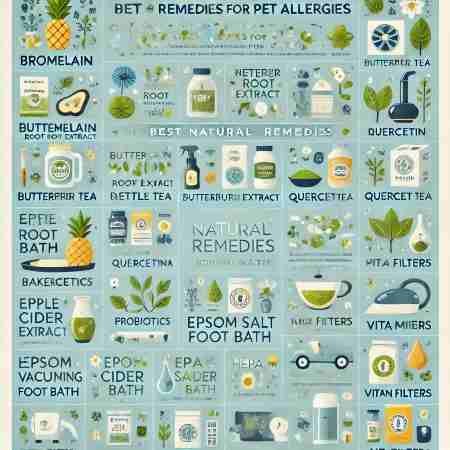
| Remedy | Details | Key Benefits | Notes |
|---|---|---|---|
| Bromelain | An enzyme from pineapples that helps reduce inflammation caused by allergies. | Reduces swelling and inflammation | Found in pineapples or available as a supplement |
| Butterbur Root Extract | A natural herb known for relieving nasal allergy symptoms. | Eases nasal congestion and sneezing | Consult a doctor before using herbal supplements |
| Nettle Tea | A tea made from nettle leaves that has anti-inflammatory properties to help with allergy symptoms. | Reduces inflammation naturally | Available in health stores or can be made at home |
| Quercetin | A nutrient found in apples, berries, and onions that helps fight allergic reactions. | Acts as a natural antihistamine | Can be added to diet or taken as a supplement |
| Probiotics | Good bacteria that improve gut health, which may reduce allergic reactions. | Supports the immune system | Found in yogurt or available as supplements |
| Apple Cider Vinegar | A natural remedy that may help with pet allergies when used in cleaning or added to pet baths. | Cleans and neutralizes allergens | Dilute before using on pets or household surfaces |
| Baking Soda | Can be used to clean surfaces or neutralize pet odors and allergens in the home. | Absorbs odors and allergens | Safe for use on carpets and pet bedding |
| Epsom Salt Foot Bath | Soak your pet’s paws in Epsom salt after walks to remove allergens. | Prevents allergens from spreading indoors | Easy and gentle on pets |
| Herbal Remedies | Natural herbs like peppermint, eucalyptus, or chamomile can help soothe allergy symptoms. | Acts as natural decongestants | Consult with a vet before use on pets |
| Vitamin C | Taking 2,000 milligrams of vitamin C daily may help reduce allergy symptoms by lowering histamine. | Boosts the immune system and reduces histamine | Available in fruits like oranges and kiwis |
| Use an Air Filter | Using an air purifier with a HEPA filter helps remove allergens from the air. | Reduces airborne allergens and improves air quality | Choose a purifier with high efficiency for best results |
| Vacuum Often with a HEPA Filter | Regular vacuuming with a HEPA filter helps remove pet hair and dander from floors and furniture. | Removes allergens from surfaces | Helps maintain a cleaner, allergen-free home |
| Set Pet-Free Boundaries | Keep pets out of certain areas of your home, like bedrooms, to reduce exposure to allergens. | Creates allergen-free zones | Especially important for bedrooms |
Top 10 Best Eye Drops for Pet Allergies
| Eye Drop Name | Type | Usage | Key Benefits | Notes |
|---|---|---|---|---|
| Pataday | Prescription Antihistamine | Treats and prevents eye allergies | Relieves itching, redness, and swelling caused by pet dander | Prescription required |
| Alomide | Prescription Eye Drop | Reduces allergic reactions in the eyes | Effective for long-term allergy control | Best for severe eye allergies |
| Zaditor | Over-the-Counter Antihistamine | Helps with allergic conjunctivitis | Fast relief from itching, redness, and watering eyes | Widely available, no prescription needed |
| Visine-A | Over-the-Counter Eye Drop | Provides relief from minor eye allergies | Reduces redness and irritation | Short-term use, not for long-term allergy control |
| Opcon-A | Over-the-Counter Eye Drop | Eases symptoms like redness and itching | Effective for mild pet allergy symptoms | May cause rebound redness if overused |
| Alaway | Antihistamine Eye Drop | Treats eye symptoms caused by pet allergies | Provides fast relief from itching and redness | Long-lasting formula |
| Artificial Tears | Lubricating Eye Drop | Moisturizes dry, irritated eyes | Washes away allergens like pet dander and dust | Safe for frequent use |
| Rohto Ice All-in-One Multi-Symptom Relief | Cooling Eye Drop | Reduces redness and cools irritated eyes | Refreshing, cooling sensation for instant relief | Not suitable for long-term allergy control |
| Systane Ultra Lubricant Eye Drops | Lubricating Eye Drop | Provides moisture and relief from dryness | Lubricates and protects the eyes from irritation | Safe for daily use |
| Thera Tears Eye Drops for Dry Eyes | Lubricating Eye Drop | Relieves dryness and irritation | Hydrates and soothes dry eyes | Can be used frequently for dryness |
| Refresh Optive Lubricant Eye Drops | Lubricating Eye Drop | Replenishes moisture in the eyes | Helps wash away allergens and reduces irritation | Good for sensitive eyes |
| Similasan Allergy Eye Relief Eye Drops | Homeopathic Eye Drop | Eases redness, itching, and dryness | Natural formula for gentle relief | Safe for daily use, available over-the-counter |
Pet Allergies {Causes, Symptoms & Side Effects}
Causes of Pet Allergies
Pet allergies are caused by immune reactions to proteins in animal skin, saliva, or urine, often triggered by pet dander.

Recommended Reading: Best Allergy Medicine For Cats: Types, Uses, & Side Effects
Causes of Pet Allergies
- Dander (Dead Skin Cells):
- Pets shed dead skin cells, known as dander, which are tiny particles that float in the air. This is a major cause of allergic reactions in people sensitive to pet allergens.
- Saliva:
- When pets groom themselves, their saliva spreads proteins to their fur, which can then transfer to surfaces in your home. These proteins can trigger allergies when touched or inhaled.
- Urine:
- Dried urine from pets, especially in litter boxes, can become airborne and cause allergic reactions in some individuals.
- Fur or Hair:
- While fur itself isn’t an allergen, it can trap dust, pollen, and other particles that may irritate individuals with allergies.
- Airborne Allergens:
- Pet allergens, such as dander and saliva, can become airborne and cling to clothing, furniture, carpets, and other items in the home, increasing exposure to allergens.
- Sweat Glands:
- Some animals, like cats, have allergens in their sweat glands. When they sweat, these allergens are released into the environment, causing reactions.
- Pet Bedding and Toys:
- Items that pets frequently use, like bedding or toys, can collect allergens over time and trigger allergic reactions when handled or disturbed.
Managing Pet Allergies
To manage pet allergies, it’s essential to minimize exposure to these allergens. Effective strategies include:
- Using HEPA air purifiers to filter allergens.
- Cleaning your home regularly to reduce allergens.
- Taking medications like antihistamines, nasal corticosteroids, or considering allergy shots to manage symptoms.
- Consider allergy shots (immunotherapy) for long-term relief.
Recommended Reading: Anti Allergy Medicine For Skin Itching (Uses & Side Effects)
Symptoms of Pet Allergies
Signs of Pet Allergies
Symptoms of pet allergies include sneezing, runny nose, itchy eyes, coughing, and asthma-like reactions.

Pet allergy symptoms can range from mild to severe and often resemble the symptoms of hay fever or asthma. These allergic reactions occur when the body responds to allergens from pets. Common signs include:
- Sneezing and Runny Nose: Allergens irritate the nasal passages, leading to frequent sneezing and a runny or stuffy nose.
- Itchy Eyes: Pet allergies can cause red, itchy, and watery eyes, making them uncomfortable and sensitive to light.
- Skin Reactions: Some people may experience rashes, hives, or eczema flare-ups if their skin comes in direct contact with pet allergens.
- Wheezing and Coughing: For individuals with asthma, pet allergies can trigger wheezing, coughing, and other breathing difficulties.
- Shortness of Breath: Breathing problems such as shortness of breath can occur due to airway constriction caused by allergens.
- Post-Nasal Drip: Pet allergies may cause excess mucus to build up in the throat, leading to a post-nasal drip sensation.
Side Effects of Pet Allergies
These side effects include:
- Nasal Congestion: Pet allergens can cause blocked nasal passages, making it hard to breathe through the nose.
- Facial Pain: Allergens may lead to sinus pressure and congestion, causing pain or discomfort in the face.
- Eczema and Skin Rash: Prolonged exposure to pet allergens can trigger skin irritation, resulting in rashes or eczema outbreaks.
- Hives: Pet allergies can lead to raised, red, itchy patches known as hives, especially after direct contact with pets.
- Anaphylaxis: In very rare cases, a severe allergic reaction like anaphylaxis can occur, which requires immediate medical care.
- Sinus Infections: Constant sinus congestion caused by allergies can increase the risk of developing sinus infections.
- Chronic Cough: Persistent coughing may occur due to irritation in the throat from constant exposure to pet allergens.
- Asthma Flare-ups: Pet allergies can trigger asthma attacks, causing shortness of breath, wheezing, and chest tightness.
- Headaches: Sinus pressure caused by allergens can result in headaches and tension around the forehead.
- Fatigue: Constant exposure to allergens may cause tiredness or fatigue due to the body’s prolonged allergic response.
- Sleep Disturbances: Nasal congestion, coughing, and breathing issues can make it hard to get a good night’s sleep, leading to sleep disturbances.
Recommended Reading: Food Allergy Treatment At Home (Causes, Symptoms, And Treatment)
Benefits of Pet Allergy Medicine
- Quick Symptom Relief: Medicines like antihistamines can quickly ease sneezing, runny nose, and itchy eyes for fast relief.
- Prevents Serious Issues: Regular use helps prevent skin rashes, hives, and breathing problems caused by pet allergens.
- Improved Breathing: For asthma sufferers, these medicines can open airways and reduce wheezing.
- Better Sleep: By managing nasal congestion and coughing, they promote better sleep.
- Less Skin Irritation: They help reduce skin reactions like rashes and hives caused by pet contact.
- More Comfort with Pets: Medications allow people to enjoy pets without constant allergy discomfort.
- Prevents Long-Term Problems: Regular use can prevent chronic issues like sinus infections and asthma attacks.
- Control Over Allergies: They provide better control over allergy symptoms, making life easier around pets.
FAQs
What Causes Pet Allergies?
Pet allergies are caused by proteins found in an animal’s skin, saliva, urine, or dander. These allergens can become airborne and spread through the house.
What Are the Common Symptoms of Pet Allergies?
Symptoms include sneezing, runny nose, itchy eyes, coughing, wheezing, and in severe cases, shortness of breath or skin rash.
How Are Pet Allergies Diagnosed?
A doctor or allergist can diagnose pet allergies using skin or blood tests. A small sample of allergen is applied to the skin or tested through blood for allergic reactions.
Can Pet Allergies Be Cured?
There’s no complete cure, but medications and immunotherapy (allergy shots) can help manage symptoms and reduce sensitivity over time.
What Treatments Are Available for Pet Allergies?
Common treatments include antihistamines (e.g., Claritin, Benadryl), nasal sprays (Flonase, Nasonex), and decongestants. For severe allergies, immunotherapy may be recommended.
Can I Live with Pets If I Have Allergies?
Yes, by reducing exposure to allergens, using air purifiers, cleaning regularly, and taking allergy medications, you can minimize symptoms.
What Are the Side Effects of Pet Allergies?
Side effects may include hay fever-like symptoms, skin rashes, hives, and in some cases, asthma or anaphylaxis.
How Can I Prevent Pet Allergy Symptoms?
Reduce exposure by limiting pet access to certain areas, cleaning your home frequently, and bathing your pets regularly. Use HEPA filters in your home to clean the air.
How Effective Are Antihistamines for Pet Allergies?
Antihistamines like Zyrtec, Allegra, and Claritin are effective in relieving itchiness, sneezing, and other allergy symptoms.
Recommended Reading: Best Allergy Medicine For Dogs Licking Paws
Conclusion
Pet allergies are a common issue, but with proper treatment, they can be managed successfully. There are many options available, from antihistamines to immunotherapy, to help reduce symptoms and improve comfort.
Understanding the causes, symptoms, and treatment options empowers individuals to take control of their allergies and still enjoy being around pets. Always consult with a healthcare provider to find the best treatment plan for your specific needs and ensure a more comfortable life with pets.
Disclaimer
Commissions we earn from partner links on this page do not influence our content. Our editorial content is based on thorough research and insights from qualified medical professionals to ensure the highest standards of accuracy and reliability.
Information provided on Doseway is for educational purposes only. Your health and wellness are unique to you, and the products and services we review may not be suitable for your circumstances. We do not offer personal medical advice, diagnosis, or treatment plans. For specific advice, please consult with a healthcare professional. Doseway adheres to strict editorial integrity standards. To the best of our knowledge, all content is accurate as of the date posted, though offers and information may change. The opinions expressed are the author’s own and have not been influenced, approved, or endorsed by our partners.

 Cart is empty
Cart is empty
Add a Comment